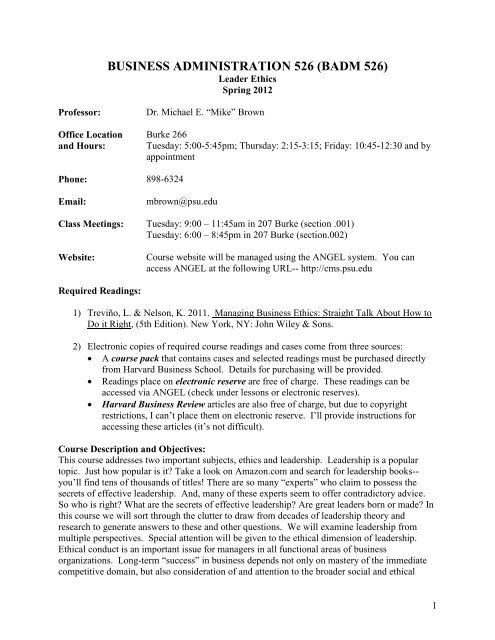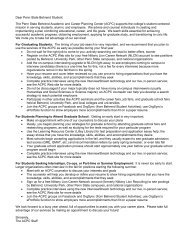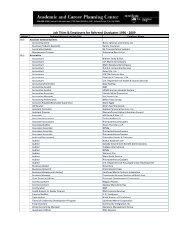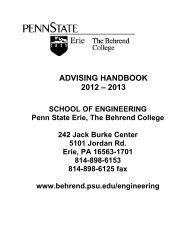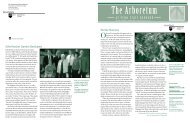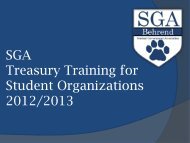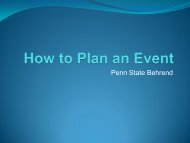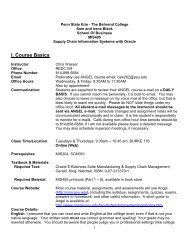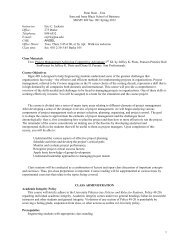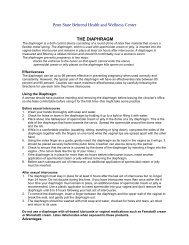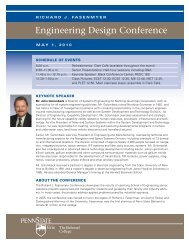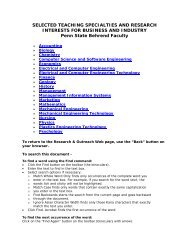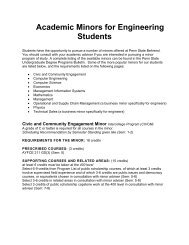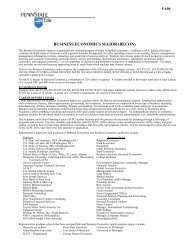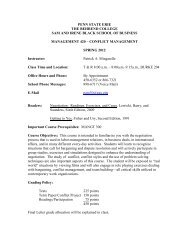B ADM 526 - Penn State Erie
B ADM 526 - Penn State Erie
B ADM 526 - Penn State Erie
You also want an ePaper? Increase the reach of your titles
YUMPU automatically turns print PDFs into web optimized ePapers that Google loves.
BUSINESS <strong>ADM</strong>INISTRATION <strong>526</strong> (B<strong>ADM</strong> <strong>526</strong>)<br />
Leader Ethics<br />
Spring 2012<br />
Professor:<br />
Office Location<br />
and Hours:<br />
Dr. Michael E. “Mike” Brown<br />
Burke 266<br />
Tuesday: 5:00-5:45pm; Thursday: 2:15-3:15; Friday: 10:45-12:30 and by<br />
appointment<br />
Phone: 898-6324<br />
Email:<br />
mbrown@psu.edu<br />
Class Meetings: Tuesday: 9:00 – 11:45am in 207 Burke (section .001)<br />
Tuesday: 6:00 – 8:45pm in 207 Burke (section.002)<br />
Website:<br />
Course website will be managed using the ANGEL system. You can<br />
access ANGEL at the following URL-- http://cms.psu.edu<br />
Required Readings:<br />
1) Treviño, L. & Nelson, K. 2011. Managing Business Ethics: Straight Talk About How to<br />
Do it Right, (5th Edition). New York, NY: John Wiley & Sons.<br />
2) Electronic copies of required course readings and cases come from three sources:<br />
A course pack that contains cases and selected readings must be purchased directly<br />
from Harvard Business School. Details for purchasing will be provided.<br />
Readings place on electronic reserve are free of charge. These readings can be<br />
accessed via ANGEL (check under lessons or electronic reserves).<br />
Harvard Business Review articles are also free of charge, but due to copyright<br />
restrictions, I can’t place them on electronic reserve. I’ll provide instructions for<br />
accessing these articles (it’s not difficult).<br />
Course Description and Objectives:<br />
This course addresses two important subjects, ethics and leadership. Leadership is a popular<br />
topic. Just how popular is it? Take a look on Amazon.com and search for leadership books--<br />
you’ll find tens of thousands of titles! There are so many “experts” who claim to possess the<br />
secrets of effective leadership. And, many of these experts seem to offer contradictory advice.<br />
So who is right? What are the secrets of effective leadership? Are great leaders born or made? In<br />
this course we will sort through the clutter to draw from decades of leadership theory and<br />
research to generate answers to these and other questions. We will examine leadership from<br />
multiple perspectives. Special attention will be given to the ethical dimension of leadership.<br />
Ethical conduct is an important issue for managers in all functional areas of business<br />
organizations. Long-term “success” in business depends not only on mastery of the immediate<br />
competitive domain, but also consideration of and attention to the broader social and ethical<br />
1
environments in which all organizations and institutions are embedded. Understanding, how to<br />
managing yourself and others in terms of ethics will be a major focus of this course. You will<br />
leave this course possessing knowledge that will help you to lead more effectively and ethically.<br />
Course Requirements and Grading:<br />
Item Description Worth<br />
Ethics Audit<br />
Working in groups of 3-5, conduct an ethics audit of a<br />
company. Write from the perspective of an ethics<br />
consultant (approximately 15 pages).<br />
20%<br />
Midterm Exam<br />
Case Analysis<br />
Class Involvement<br />
Final Exam<br />
A closed book/closed note midterm exam (essays and<br />
short answers) given in class on 2/28<br />
Working in groups of 3-5 (you chose your own groups),<br />
analyze 2 case studies (from the second ½ of the<br />
course). I’ll assign questions for each case. Write your<br />
responses in approximately 10 pages (double-spaced, 12<br />
point font, 1 inch margins). You only need to turn in<br />
one group paper, however, I expect each group member<br />
to contribute to each paper.<br />
(2 papers * 10% each = 20%)<br />
You are expected to attend class and participate in<br />
discussions/activities on a daily basis.<br />
A closed-book final exam (essays and short answers)<br />
given during the final examination period.<br />
25%<br />
20%<br />
10%<br />
25%<br />
TOTAL 100%<br />
Exams<br />
Exams will consist of essays and short answers. Each exam will be closed book and closed note.<br />
The exam will cover course readings, cases and class notes. Each exam is worth 25% of your<br />
grade. I’ll provide more information on the exam format (including sample questions) by the<br />
end of January. Note: The final exam will not be cumulative. Sorry, but no laptops are<br />
permitted!<br />
Case Analyses<br />
You will be required to analyze two cases. Questions for each case will be provided. These<br />
questions should be used as a guideline in preparing the analysis. However, you are welcome to<br />
address other relevant issues not covered in the case questions. Case analyses will be evaluated<br />
on the basis of how thoroughly the questions assigned to the case are answered, how thoroughly<br />
and appropriately course concepts and theories are used in the analysis, on the adequacy of and<br />
support for recommendations made, and on the clarity and technical accuracy of the writing<br />
2
style. The analyses should be approximately 10 double-spaced pages (12 point font, 1 inch<br />
margins). Note— team members are expected to make a meaningful contribution to each case<br />
study. If a student is not pulling his/her fair share of the work load, then team members have an<br />
obligation to warn the slacking teammate about his/her performance. If the student’s<br />
performance doesn’t improve, then team members should notify me immediately. Ultimately, if<br />
the team determines that a member made a subpar contribution to final paper, then the member<br />
will receive limited (i.e. partial or no) credit.<br />
Class Involvement<br />
Your attendance and active participation in class is important because it enhances your ability<br />
(and the abilities of those around you) to analyze and comprehend the concepts and theories.<br />
Attendance. The Black School of Business MBA Attendance Policy states “MBA students are<br />
expected to attend every scheduled class. Students who must miss a class should speak with<br />
their professor(s) as soon as they learn of the potential absence. Students who miss 4 classes in<br />
this course will receive a failing grade. Students are encouraged to drop the course as soon as<br />
they realize that they cannot maintain an acceptable attendance level. Exceptions will be made<br />
on a case by case basis and will be allowed only when there is a documented personal or family<br />
emergency, military service, or jury duty. Work-related travel is not considered a personal<br />
emergency.”<br />
Participation. Students are expected to be prepared for and participate in each and every class<br />
discussion, case, and assigned activity. Participation points are earned per class, not per<br />
comment so as not to encourage “air time” (i.e. dominating and/or excluding classmates from<br />
discussions). Participation points will also be determined based on the quality of the<br />
contribution (i.e. a “me too” comment is typically not as valuable as one that requires significant<br />
insight or analysis). I’ll always try to call on students who have not had an opportunity to<br />
participate in a particular class, but I’ll also ask your cooperation in making sure that everyone<br />
has a chance to contribute to class if they wish.<br />
The system. I will assess class involvement with your help based on a system of self-reporting<br />
participation slips that you will hand in to me at the end of each class meeting. Write your name<br />
and date on a blank piece of paper, along with a brief summary of any contributions that you<br />
made to class that evening (if you didn’t contribute, just leave that part blank). I’ll keep your<br />
slips as a record so that when I calculate your involvement grade at the end of the semester, I’ll<br />
at least have some objective record of your attendance and participation. I’ll explain how this<br />
system works on the first day of class.<br />
Overall, you will receive some credit just for showing up to class. You will earn additional<br />
credit if you make a quality contribution to class. Class participation will be evaluated primarily<br />
on the quality of your reasoning, depth of analysis, relevance of comments to the discussion, and<br />
integration/application of concepts, cases, and readings. Perfect attendance is not enough to<br />
earn a good involvement grade. You must also contribute!<br />
Grades: Grades will be assigned on the following scale.<br />
A = 93-100 B- = 80-82<br />
3
A- = 90-92 C+ = 77-79<br />
B+ = 87-89 C = 70-76<br />
B = 83-86 D = 60-69<br />
F = 59 and below<br />
Academic Integrity:<br />
Academic integrity is a basic guiding principle for all academic activity at the University, and all<br />
members of the community are expected to adhere to this principle. Specifically, academic<br />
integrity is the pursuit of scholarly activity in an open, honest, and responsible manner. It<br />
includes a commitment not to engage in or tolerate acts of falsification, misrepresentation, or<br />
deception. Such acts violate the fundamental ethical principles of the University community and<br />
undermine the efforts of others.<br />
Violations of academic integrity are not tolerated at <strong>Penn</strong> <strong>State</strong> <strong>Erie</strong>. Violators will receive<br />
academic and may receive disciplinary sanctions, including the awarding of an F or XF grade (I<br />
typically give Fs for the course to students who violate academic integrity). An XF grade is<br />
recorded on the transcript and states that failure of the course was due to an act of academic<br />
dishonesty. All acts of academic dishonesty are recorded so that repeat offenders can be<br />
sanctioned accordingly.<br />
Such violations of academic integrity include but are not limited to:<br />
Cheating: Using crib sheets; using notes or books during a closed book exam.<br />
<br />
<br />
<br />
<br />
<br />
Copying on a test: Looking at other unsuspecting students' exams and copying; copying<br />
in a complicit manner with another student; exchanging color-coded exams for the<br />
purpose of copying; passing answers via notes; discussing answers in exam.<br />
Plagiarism: The fabrication of information and citations; copying from the Internet or<br />
submitting the work of others from professional journals, books, articles and papers;<br />
submission of other students' papers (in part or total) and representing the work as one's<br />
own; fabricating in part or total, submissions and citing them falsely.<br />
Acts of aiding or abetting: Facilitating academically dishonest acts by others;<br />
unauthorized collaboration of work; permitting another to copy from exam; writing a<br />
paper for another; inappropriately collaborating on home assignments or exams without<br />
permission or when prohibited.<br />
Unauthorized possession: Buying or stealing exams; failing to return exams on file;<br />
selling exams; photocopying exams; any possession of an exam without the faculty<br />
member's permission.<br />
Submitting previous work: Submitting a paper, case study, lab report, or any<br />
assignment that had been submitted for credit in a prior class without the knowledge and<br />
permission of the instructor.<br />
4
Tampering with work: Changing one's own or another student's work product such as<br />
papers or test answers; tampering with work either as a prank or in order to sabotage<br />
another's work.<br />
Ghosting or misrepresentation: Having another student take a quiz, an exam, or<br />
perform an exercise or similar evaluation in one's place.<br />
Altering exams: Changing incorrect answers and seeking favorable grade adjustments<br />
when instructor returns graded exams for in-class review and subsequently collects them,<br />
asserting that the instructor made a mistake in grading; other forms may include changing<br />
the letter and/or the numerical grade on a test.<br />
Computer theft: Electronic theft of computer programs or other software, data, images,<br />
art, or text belonging to another.<br />
<strong>Penn</strong> <strong>State</strong>’s Nondiscrimination Policy: The <strong>Penn</strong>sylvania <strong>State</strong> University is committed to a<br />
policy that all persons shall have equal access to programs, facilities, admission, and<br />
employment without regard to personal characteristics not related to ability, performance, or<br />
qualifications as determined by University policy or by Commonwealth or Federal authorities.<br />
<strong>Penn</strong> <strong>State</strong> does not discriminate against any person because of age, ancestry, color, disability<br />
or handicap, national origin, race, religious creed, sex, sexual orientation, or veteran status.<br />
5
SCHEDULE<br />
T&N: Trevino & Nelson; ER= Electronic Reserves; HBR = Harvard Business Review; CP =<br />
Course Pack<br />
DATE TOPIC READINGS ASSIGNMENTS DUE<br />
1/10 Introduction T&N: Chapter 1 None<br />
1/17 Topic: Deciding<br />
What’s Right: A<br />
Prescriptive<br />
Approach<br />
1/24 Topic: Deciding<br />
What’s Right: A<br />
Psychological<br />
Approach<br />
1/31 Topic: Ethics at the<br />
Organizational Level<br />
2/7 Topic: Managing for<br />
Ethical Conduct<br />
2/14 Topic: Corporate<br />
Social Responsibility<br />
2/21 Topic: International<br />
Business Ethics<br />
T&N: Ch. 2 and Pinto Fires<br />
Case: Pinto Fires<br />
T&N: Ch. 3<br />
T&N: Ch. 5, 6<br />
Case: Improving an Ethical<br />
Culture at Georgia-Pacific<br />
T&N: Ch. 7<br />
Films: Milgram and Zimbardo<br />
T&N: Ch. 9, 10<br />
Case: Merck<br />
T&N: Ch. 11<br />
Case: Google Goes to China<br />
Be prepared to discuss<br />
chapter and questions at<br />
end of the case<br />
Be prepared to discuss<br />
chapter<br />
Be prepared to discuss<br />
chapter and questions at<br />
end of the case<br />
Be prepared to discuss<br />
chapter<br />
Be prepared to discuss<br />
chapter and questions at<br />
end of the case<br />
Be prepared to discuss<br />
chapter and questions at<br />
end of the case<br />
Ethics audit assignment<br />
is due in class<br />
2/28 Exam #1 6-8pm<br />
3/6 Spring Break<br />
6
DATE TOPIC READINGS ASSIGNMENTS DUE<br />
3/13 What is leadership? 1.Author = Kotter<br />
Title = What leaders really<br />
do (HBR)<br />
Be prepared to discuss:<br />
2. Yukl & Lepsinger: Why<br />
Integrating the Leading…<br />
(ER)<br />
Case Study:<br />
Iggy’s Bread… (CP)<br />
a) In your own words,<br />
define leadership.<br />
b) Are managers and<br />
leaders different? If so,<br />
how?<br />
c) Can an unethical<br />
leader be an effective<br />
leader?<br />
c) The assigned case<br />
questions (posted on<br />
2/28)<br />
3/20 What are the traits of<br />
effective leaders?<br />
1. Kirpatrick & Locke:<br />
Leadership: Do traits<br />
matter? (ER)<br />
2. Soriano: Political skill in<br />
organizations (ER)<br />
3. Online personality tests<br />
(check course website for<br />
links to personality tests)<br />
Take the online<br />
personality test.<br />
Familiarize yourself with<br />
the “Five Factor” model<br />
and bring your<br />
personality report to class<br />
Also be prepared to<br />
discuss:<br />
a) Are great leaders<br />
“born” or made”?<br />
b) What are the traits of<br />
effective leaders?<br />
c) What is the Five<br />
Factor Model of<br />
Personality?<br />
d) What have you learned<br />
about your<br />
personality?<br />
7
DATE TOPIC READINGS ASSIGNMENTS DUE<br />
3/27 How do effective<br />
leaders persuade and<br />
influence others?<br />
1. Cialdini: Harnessing the<br />
science of persuasion<br />
(HBR)<br />
Be prepared to discuss:<br />
2. Grenny et al.: How to have<br />
influence (ER)<br />
Case Study:<br />
Koehn: Leadership in crisis…<br />
(CP)<br />
a) How do effective<br />
leaders influence and<br />
persuade others?<br />
b) The assigned case<br />
questions (posted on<br />
3/13)<br />
4/3 What is the best<br />
“style” of leadership?<br />
1. Goleman: Leadership that<br />
gets results (HBR)<br />
2. Sidle: The Danger of Do<br />
Nothing Leaders (ER)<br />
Case Study:<br />
Gabarro: Wolfgang Keller<br />
(CP)<br />
Be prepared to discuss:<br />
a) What is the best<br />
“style” of leadership?<br />
b) What style of<br />
leadership do you<br />
prefer?<br />
c) The assigned case<br />
questions (posted on<br />
3/20)<br />
4/10 Charisma: Can you<br />
lead effectively<br />
without it?<br />
1. Howell & Avolio: The<br />
ethics of charismatic<br />
leadership… (ER)<br />
2. Bass: From transactional to<br />
transformational… (ER)<br />
3. Tassler: Five secrets of<br />
charismatic leadership (on<br />
ANGEL)<br />
4. Muir: Relationship building<br />
and sales success (ER)<br />
Case Study:<br />
HP at a Strategic Crossroad<br />
(CP)<br />
Be prepared to discuss:<br />
a) What is charisma?<br />
b) What is<br />
transformational<br />
leadership?<br />
c) Charisma: Can you<br />
lead effectively<br />
without it?<br />
d) The assigned case<br />
questions (posted on<br />
3/27)<br />
8
DATE TOPIC READINGS ASSIGNMENTS DUE<br />
4/17 Leading in<br />
ambiguous,<br />
unfamiliar, and<br />
uncertain<br />
environments?<br />
1. Coutu: Sense and<br />
Reliability… (HBR)<br />
2. Mintzberg & Westley:<br />
Decision-making… (ER)<br />
Be prepared to discuss:<br />
3. Day & Schoemaker: Are<br />
you a ‘vigilant leader’?<br />
(ER)<br />
Case Study:<br />
Fire at Mann Gulch (CP)<br />
a) What is the underlying<br />
theme of this week’s<br />
readings (please<br />
assume there is one)?<br />
b) What is sensemaking?<br />
c) The assigned case<br />
questions (posted on<br />
4/3)<br />
4/24 What is ethical<br />
leadership?<br />
Final Exam<br />
1. Trevino: Moral Person and<br />
Moral Manager…<br />
(ER)<br />
2. Brown: Misconceptions of<br />
Ethical Leadership (ER)<br />
3. Messick and Bazerman:<br />
Ethical leadership and the<br />
psychology… (ER)<br />
Case Studies:<br />
Coach K and Coach K (CP)<br />
The final exam will be given<br />
during finals week at a date<br />
and time to be determined by<br />
the Registrar<br />
Be prepared to discuss:<br />
a) What is ethical<br />
leadership?<br />
b) Is ethical leadership<br />
related to effective<br />
leadership? If so, how?<br />
c) Answer the assigned<br />
case questions (posted<br />
on 4/10)<br />
CP = Course Pack, ER = Electronic Reserve, HBR = Harvard Business Review<br />
9


